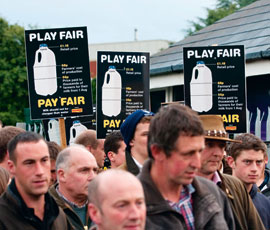Legislate if dairy code fails say MPs

MPs are calling to legislation to bind contracts between milk processors and dairy farmers if the new voluntary code of practice fails to work.
The code was agreed eight months ago but not all dairy processors have implemented it.
The Welsh Affairs Committee now wants the UK government to consider legislating for a statutory code if the current model fails.
It is estimated that 85% of British milk is bound by the voluntary code but unless it leads to “tangible improvements” legislation is needed, said David Davies MP, who chairs the committee.
“We believe adherence to a voluntary code is the best option. To give it the best chance to be effective, we urge all dairy processors who have not yet signed the voluntary code to do so,” said Mr Davies.
“However, many also believe it would be right for government to legislate if the code does not lead to tangible improvements, and we have seen examples in other industries where a voluntary code is not always enough.”
The dairy industry is worth £420m to the Welsh economy and there are 1,901 dairy farmers in Wales.
Mr Davies said he hoped that the committee’s report, now published following its inquiry into how the code is working, will maintain pressure on the industry to deliver a fairer deal for dairy farmers. “If it does not work, the government should stand ready to ensure that fairer deal through a mandatory code,” insisted Mr Davies.
Under the new code, processors must allow 30 days’ notice of a milk price cut or other significant changes to contractual terms.
Farmers can also terminate their contract with processors on three months’ notice if they disagree with a proposed price cut or significant change to contractual terms.
Dairy UK, which represents milk processors, said it welcomed the recognition in the report that the voluntary code of practice was an important step forward and that it must be given time to work.
Jim Begg, Dairy UK director general said: “We would go further and say that this has been a massive step forward for the dairy industry in Wales, where dairy farming is of considerable economic and social importance.
“The approach of the dairy companies in Wales and throughout the UK to the implementation of the voluntary code has been responsible and constructive. Many have gone beyond the remit of the code with new pricing arrangements. This is recognised by the committee which commends the work already carried out by a number of dairy processors to develop formulae for determining milk prices
“We must remember that the Code is voluntary. 85% penetration is therefore very high. The code has effectively established itself as best practice in the industry which we believe has created a strong commercial dynamic for its further uptake.”
Committee’s key conclusions
- Voluntary code of practice is important step to redress the balance between dairy producer and purchaser.
- Committee urges all dairy processors to sign up.
- Code must be given time to work.
- UK government should set out when and how it intends to measure the success of the code.
- UK government must work with Welsh administration to legislate if code fails to meet targets.
More on the fight for fairer milk prices
